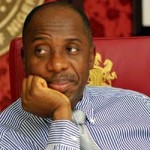Climate Change: AFDB Seeks Establishment Of Carbon Sink Fund
African News, Latest Headlines, News Across Nigeria Monday, January 10th, 2022
(AFRICAN EXAMINER) – African Development Bank (AfDB) has harped on the need to establish the proposed long-term carbon sink to offset carbon emissions with a view to ameliorating the impact of climate change.
Carbon Sink Fund involves activities and mechanisms that absorb carbon dioxide in the atmosphere to offset carbon emissions through afforestation, reforestation, forest management, and other activities. The Fund remunerates participant countries in accordance with negotiation contracts for verifiable emission reductions (ERs).
As the effects of global climate on modern society become increasingly severe, the international community has begun to pay greater attention to the economic ecological function of forests, especially their function of absorbing carbon dioxide and directly or indirectly improving the climate and environment.
After the Kyoto Protocol came into effect, forestry carbon sinks were officially added to the transaction types of clean development mechanism projects, which have since been widely regarded as an important way to deal with climate warming.
President of the AfDB, Dr. Akinwumi Adesina made this observation recently at the bank’s 2021 Kofi Annan Eminent Speaker Lecture Series.
The Kofi Annan Lecture Series has covered a range of African and global development topics, which include economics, finance, regional integration, human development and the environment, over the years. The lectures have been a forum for eminent persons to share policy insights on development challenges in Africa.
Dr. Adesina said it is pertinent to establish the proposed long-term carbon sink fund to compensate countries like Gabon and the Democratic Republic of Congo (DRC) for preserving vast forests that sequester carbon dioxide.
Data from the National Climate Council shows that Gabon, a central African nation with pollution of over 2 million, is the second most forested country in the world. With 87 percent of its territory covered in tropical rainforest and an annual deforestation rate lower than 0.1 percent over the last 30 years.
In addition, the forests of Gabon have immense biodiversity, with more plant species than all West Africa’s forests combined. The country is also one of the few places left in the world where forest elephants can roam all the way from forest to sea and can be found sauntering along the beach. Moreover, Gabon currently has 13 national parks and its forests are home to about 60 percent of the African forest elephants.
Similarly, the DRC is another frontline country that is superfluously endowed with tropical rain forest, which serves as a carbon sink and important buffer to fight climate change.
Notably, the DRC Government has been working with the World Bank and partners since 2010 to develop the Mai-Ndombe Emission Reductions Programme, which has already established over 13,000 hectares of forest ‘exclosures’ (areas where animals are not allowed to graze). It also has close to 4,000 hectares of acacia plantations, improved the livelihoods of very poor farmers, and reduced slash-and-burn agricultural practices that cause deforestation and carbon emissions.
DRC’s Minister of Finance, Yav Mulang said the forest communities are the real winners, adding that the agreement will allow the DRC to secure long-term public and private finance to provide alternatives to deforestation and reward efforts to mitigate climate change, reduce poverty, and manage natural resources sustainably.
“It is a major step towards implementing the country’s green development vision and contributes to the Paris Agreement and the Sustainable Development Goals”, he added.
According to experts, the Gabonese and Congolese forests help to create the rainfall in the Sahel and that if the Congo Basin is lost, rainfall will consequently be lost across Africa. In other words, losing the carbon stocks in the Congo Basin, which represent about 10 years of global emissions of CO2, will result in losing the fight against climate change in the region.
The AfDB president also stressed the importance of accurate carbon pricing as an incentive to developing nations. He equally harped on the need to weigh the Gross Domestic Product (GDP) of countries by the extent of negative externalities they create. “GDP tells us very little about how wealth is produced”, he further stated.
Earlier in her keynote address, entitled “Good Economics for Warmer Times – How to Address Our Climate Change Challenge”, the 2019 Economics Nobel Laureate and professor of economics at the Massachusetts Institute of Technology (MIT), Prof. Esther Duflo said the poorest countries will bear the worst effects of climate change and the highest costs in terms of economic production and higher mortality.
Prof. Duflo noted that the imbalance between wealthy and poor countries followed the ‘10-50 rule’ which according to her, implies that 10 percent of the highest polluters are responsible for about 50 percent of global emissions, and 50 percent of the bottom emitters are responsible for 13 percent of global emissions.
She attributed the disparity in part to the reluctance of wealthy countries to forcefully commit to tackling climate change. She however, pointed out that the International Monetary Fund (IMF) had made an estimate of $50 billion as the cost package for Covax to help most of the countries of the world vaccinate up to 60 percent of their population within two years. The estimated potential benefit, she said, was $9 trillion, which she added was an obvious win-win.
The Nobel laureate further noted that the global efforts to tackle COVID-19 pandemic had dampened her optimism about the global responses to climate change. Prof. Duflo therefore urged immediate action but warned that the world cannot rely on innovation alone.
“The impact of purely technological solutions is often very disappointing in real life. Combating climate change globally will require changes in behavior and consumption patterns. Economists underestimate the capacity of humans to change behaviors, and that shifts in consumption would need to be made primarily in industrialized countries. I don’t think we can tell Africans with a straight face that they need to consume less when they in fact need to consume more”, she stressed.
AfDB’s Acting Chief Economist and Vice President Kevin Urama said the topic could not be timelier, coming right after the COP26 global climate conference in Glasgow barely two months ago.
In a related development, Africa Climate Change Fund interim coordinator, Audrey-Cynthia Yamadjako said the Fund through its action of building the climate finance readiness of African countries, adding that its unique objectives of targeting local communities, national institutions and Non-Governmental Organizations (NGOs), is an instrument showing great complementarity with the international climate funds and promoting direct access.
“The huge interest received during our calls for proposals and requests for more engagement received from member countries shows that more needs to be done and more resources are required in the Africa Climate Change Fund to continue its action”, she further explained during a panel discussion with climate experts on the sidelines of the COP26.
The event which was moderated by Arona Soumare, Principal Climate Change and Green Growth Officer at the African Development Bank (AfDB), showcased the Fund’s work supporting African countries in unlocking climate finance through a portfolio of 16 projects.
Soumare reiterated the role of the Africa Climate Change Fund in bridging the gap and offering opportunities to entities that otherwise would not have access to climate finance.
Interestingly, private investors have also expressed their interest in exploring the inherent opportunities in getting fully involved in Africa’s fledgling transition to net-zero carbon dioxide emissions.
Related Posts
Short URL: https://www.africanexaminer.com/?p=72657






















